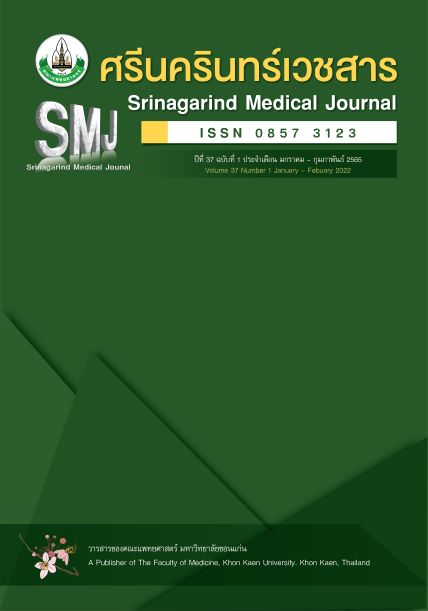อาการจิตเวชที่สัมพันธ์กับผู้ที่ใช้กัญชาทางการแพทย์
Abstract
Psychiatric symptoms related to patients who used medicinal cannabis
หลักการและวัตถุประสงค์: คลินิกกัญชาทางการแพทย์ มีแนวทางการดูแลผู้ใช้กัญชาทางการแพทย์และรายงานข้อมูลอาการทางคลินิก การวิจัยนี้ศึกษาความสัมพันธ์ระหว่างปัจจัยส่วนบุคคล อาการสำคัญที่มารักษา/ข้อบ่งชี้ชนิดกัญชาทางการแพทย์ กับการเกิดอาการทางจิตเวชในผู้ที่ใช้กัญชาทางการแพทย์
วิธีการศึกษา: รูปแบบการศึกษาย้อนหลังเชิงพรรณนา จากข้อมูลทุติยภูมิของผู้ใช้กัญชาทางการแพทย์จากระบบรายงานการให้บริการกัญชาทางการแพทย์ (Cannabis Clinic Data Center: C-MOPH) ปี งบประมาณ 2563 จำนวน 6,202 ราย วิเคราะห์ข้อมูลใช้สถิติเชิงพรรณนา วิเคราะห์ความสัมพันธ์สถิติถดถอยพหุโลจิสติกส์ และสถิติไคสแควร์
ผลการศึกษา: พบว่า ไม่เกิดอาการทางจิตเวชร้อยละ 96.73 เกิดอาการทางจิตเวช ร้อยละ 3.27 โดยพบมากที่สุดได้แก่ อาการซึมเศร้า ร้อยละ 2.05 โดยปัจจัยที่สัมพันธ์กับการเกิดอาการทางจิตโดยรวมอย่างน้อย 1 อาการขึ้นไปหลังได้รับกัญชาทางการแพทย์ มีเพียงปัจจัยเดียวที่สัมพันธ์อย่างมีนัยสำคัญทางสถิติ คือ อาการสำคัญที่มารักษา/ข้อบ่งชี้ ซึ่งมี 4 ข้อบ่งชี้ ได้แก่ ภาวะกล้ามเนื้อหดเกร็งในผู้ป่วยโรคปลอกประสาทเสื่อมแข็ง, โรคพาร์กินสัน, โรคปลอกประสาทอักเสบอื่น ๆ และ มีตั้งแต่ 2 อาการร่วมกัน (Adj.OR = 3.23, 2.45, 13.57, 2.15 ตามลำดับ) ทั้งนี้ เมื่อแยกตามการเกิดอาการทางจิตเวชที่เกิดขึ้น พบ ปัจจัยด้านอายุ เพศ อาการสำคัญที่มารักษา/ข้อบ่งชี้ และชนิดกัญชาทางการแพทย์สัมพันธ์กับอาการทางจิตเวชบางอาการ
สรุป: ปัจจัยที่สัมพันธ์กับการเกิดอาการทางจิตเวช อย่างมีนัยสำคัญทางสถิติ คือ อาการสำคัญที่มารักษา/ข้อบ่งชี้ ของผู้ใช้กัญชาทางการแพทย์
คำสำคัญ: อาการทางจิตเวช กัญชาทางการแพทย์
Background and Objective: There is a guideline for caring and report system of medicinal cannabis users in medical cannabis clinic. This research aim to study association between personal data factor, major symptoms for treatment/indications, medicinal cannabis type and occurrence of psychiatric symptoms in patients with medicinal cannabis use.
Method of study: This was a descriptive retrospective study. The secondary data of 6,202 patients receiving medicinal cannabis from the Cannabis Clinic Data Center (C-MOPH) in 2020 was used. Descriptive statistics, multiple logistic regression and chi-square test were applied in analysis of data.
Results: The results found that 96.73% did not find the occurrence of psychiatric symptoms and 3.27% found the occurrence of psychiatric symptoms. Depression was the most found with 2.05%. Only one factor associated with the occurrence of one or more psychiatric symptoms in overall after medicinal cannabis use which was major symptoms for treatment/indications factor. The factor consisted of muscle spasms in patients with multiple sclerosis (MS), Parkinson's disease, other multiple sclerosis, and two or more symptoms (Adj.OR = 3.23, 2.45, 13.57, 2.15 respectively). However, age, sex, major symptoms for treatment/indications and medicinal cannabis type associated with some psychiatric symptoms.
Conclusion: Major symptoms for treatment/indications of medicinal cannabis users associated with the occurrence of psychiatric symptoms.
Keywords: psychiatric symptoms, medicinal cannabis


